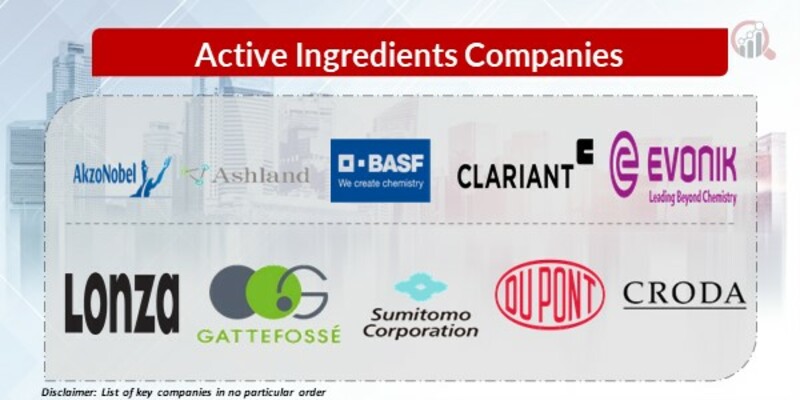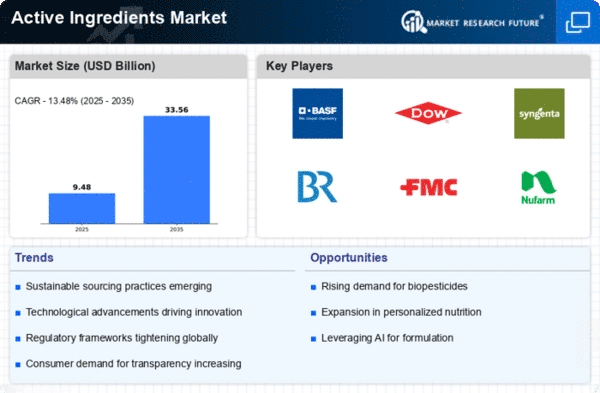Top Industry Leaders in the Active Ingredients Market
 The active ingredients (AI) market, a cornerstone of the pharmaceutical, agrochemical, and personal care industries, pulsates with dynamic competition. Understanding this landscape is crucial for stakeholders seeking to navigate its complexities and emerge successful. This analysis delves into the key strategies, market share influencers, recent industry news, and developments shaping the AI market over the past six months.
The active ingredients (AI) market, a cornerstone of the pharmaceutical, agrochemical, and personal care industries, pulsates with dynamic competition. Understanding this landscape is crucial for stakeholders seeking to navigate its complexities and emerge successful. This analysis delves into the key strategies, market share influencers, recent industry news, and developments shaping the AI market over the past six months.
Strategies for Survival and Growth:
Innovation Through R&D: Leading players prioritize research and development, investing in advanced formulations with enhanced therapeutic effects, improved crop protection, and superior cosmetic benefits. This allows them to differentiate themselves and command premium pricing.
Cost Leadership: Companies in price-sensitive sectors like generic pharmaceuticals and mass-market personal care focus on optimizing production processes, sourcing raw materials strategically, and achieving economies of scale to offer competitively priced AIs.
Collaboration & Partnerships: Strategic alliances with key players like pharmaceutical manufacturers, agribusinesses, and cosmetics brands streamline supply chains, secure distribution networks, and open doors to new markets and technologies.
Vertical Integration: Some companies integrate forward or backward, acquiring control over raw material sourcing or final product distribution, to secure supply chains, improve margins, and gain market share.
Geographical Expansion: Emerging markets with growing healthcare spending and populations present lucrative opportunities. Players are expanding their reach through acquisitions, partnerships, and establishing local manufacturing facilities.
Factors Influencing Market Share:
Product Quality & Consistency: Maintaining high-quality standards and consistent supply is paramount for building trust and retaining customers. Regulatory compliance and stringent quality control processes are essential.
Cost Competitiveness: Balancing affordability with profitability is crucial, especially in price-sensitive segments. Companies need to optimize production costs while ensuring quality remains uncompromised.
Technological Advancements: Investing in novel manufacturing techniques, automation, and digitalization improves efficiency, reduces costs, and enables the production of complex, high-value AIs.
Sustainability: Growing environmental awareness is pushing companies towards eco-friendly manufacturing practices and sourcing sustainable raw materials. This not only reduces environmental impact but also caters to the evolving consumer preferences.
Regulatory Landscape: Staying abreast of evolving regulations and adapting production processes accordingly is crucial for market access and compliance.
Key Players
-
AkzoNobel N.V. (The Netherlands)
-
Ashland (US)
-
BASF SE (Germany)
-
Clariant (Switzerland)
-
Evonik Industries AG (Germany)
-
Lonza (Switzerland)
-
Gattefossé(France)
-
Sumitomo Corporation (Japan)
-
DuPont (US)
-
Croda International Plc (UK)
-
Eastman Chemical Company (US)
-
FMC Corporation (US)
-
Sipcam (US)
-
United Phosphorus Limited (India)
-
Nufarm Limited (Australia)
-
ADAMA Agricultural Solutions Limited (Israel)
-
PotashCorp (Canada)
-
Israel Chemicals Ltd (Israel)
-
K+S AG (Germany)
-
IFFCO (India)
-
Pfizer Inc. (US)
-
Novartis International AG (Switzerland)
-
Merck & Co. (Germany)
-
Teva Pharmaceutical Industries Ltd (Israel)
-
Mylan N.V. (US)
-
Boehringer Ingelheim (Germany)
-
Hoffmann-La Roche AG (Switzerland)
-
Sanofi (France)
-
AbbVie (US)
-
AstraZeneca (UK)
Recent Developments:
-
July 2023: BASF and Evonik form a joint venture to develop and produce sustainable ingredients for the cosmetics industry. -
August 2023: The Indian government announces incentives for local API production, aiming to reduce dependence on imports and boost domestic manufacturing. -
September 2023: The European Commission proposes stricter environmental regulations for API production, pushing companies towards greener practices. -
October 2023: A new AI-powered platform is launched to streamline the sourcing and procurement of ingredients, improving efficiency and transparency in the supply chain. -
November 2023: The World Health Organization calls for increased transparency and collaboration in the AI market to address shortages and ensure equitable access to essential medicines. -
December 2023: A major cyberattack disrupts a leading API manufacturer, highlighting the growing cybersecurity threats in the industry.











